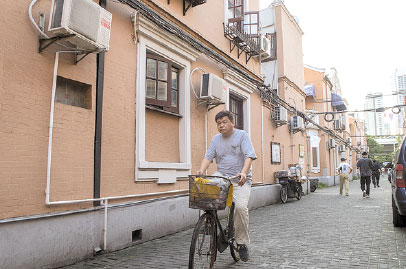Six more jewels in Shanghai's architectural crown
By Zhou Wenting ( China Daily ) Updated: 2016-07-02 09:34:49 |
|
Simingcun is one of the best preserved shikumen residential complexes in the city.[Photo by Gao Erqiang/ China Daily] |
Longmencun
Longmencun, or Dragon Gate Village, was well-known in Shanghai early last century. This neighborhood on Shangwen Road with 4-meter-wide alleys is the only one in the city that embraces 76 houses of various foreign styles and is classed as a city-level immovable cultural relic. When it was announced in 1932 that the land would be used for housing, wealthy people snapped it up and called in architects to design and build garden villas for them. All of the houses have fireplaces, in Shanghai a preserve of the rich in those days, and one big family lived in a three-story house.
Address: Lane 133, Shangwen Road, Huangpu district
Simingcun
Construction of this shikumen residential complex close to Jing'an Temple in the downtown area was completed in the 1930s and was initially the staff dormitory of the Ningpo Commercial and Savings Bank Ltd. The neighborhood has alleys that are 5 to 6 meters wide, double the width of most others, to make it more easily passable for vehicles. All houses have well-equipped kitchens, bathrooms, and a balcony on the third floor and half have a garage. Xu Zhimo, one of China's most revered poets, and the socialite Lu Xiaoman made it their marital home. Hu Die, the starlet of the 1930s, also lived here.
Address: Lane 913, Middle Yan'an Road, Jing'an district
Alley 96 On Shaoxing Road
This is one of the city's best preserved shikumen communities of typical 1930s Shanghainese lanehouses. The balconies on the three-story houses are oval and the railings are curved and resemble the shape of rose petals. Locals call them "rose balconies". The alley has appeared in a number of movies and TV plays that have old Shanghai as a backdrop, and residents are used to camera crews showing up around their houses.
Address: Lane 96, Shaoxing Road, Huangpu district
Shang Fang Garden
There are 74 three- or four-storey villas of mostly Spanish style in the community in the downtown area. They were built by British business people in the 1940s. Before that, the community was a private garden with Western style lawns and cottages of a few Jewish families.
Address: Lane 1285, Middle Huaihai Road, Xuhui district
Foreign-style Lanes
In the 1920s and '30s, the Hungarian-Slovak architect Laszlo Hudec designed the 29 high-class garden villas in the foreign-style lanes in Xinhua Road, which became the avenue to welcome State guests who arrived in Shanghai from Hongqiao International Airport in the 1970s and '80s. The two alleys interconnect and form a U-shape lane. The town houses are of styles characteristic to various countries, including Britain, Italy, the Netherlands and the United States, and many expats lived in them when they were first built, so locals call them "the foreign-style lanes".
Address: Lane 211 and Lane 329, Xinhua Road, Changning district
Menghua Street
Few streets have managed to retain as much of their original look this one in Shanghai old town, in Huangpu district. Here you can feel as though you have stepped back to a time when the term urbanization had not even been thought of. This is the place where Shanghai took shape in 1291 during the Yuan Dynasty (1279-1368) and an 8-meter-high rampart around the county was built in the 1550s to defend it from foreign pirates. It was torn down later. The one- or two-story houses have never been renovated, and yellowish quilts are placed on deck chairs in the street for residents to sit in and enjoy the sunshine. Middle-aged men gather around a small table to play Chinese chess as their wives knit sweaters and chat.
Address: Menghua Street, Huangpu district
|
|
|
|
|
|
|
|

























 Raymond Zhou:
Raymond Zhou: Pauline D Loh:
Pauline D Loh: Hot Pot
Hot Pot Eco China
Eco China China Dream
China Dream China Face
China Face






